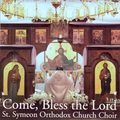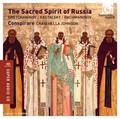Alexander Gretchaninoff (1864-1956)

GRETCHANINOFF, Alexandre Tikhonovich (b. 13 [25] October, 1864, Moscow; d. 4 January, 1956, New York) — studied at the Moscow Conservatory (1881-1890) and the St. Petersburg Conservatory (1890- 1893), which he completed in composition as a student of Rimsky-Korsakov. Collaborated with various choral ensembles, including Melnikov’s Choir in St. Petersburg, the Moscow Synodal Choir and Vasilyev’s Choir in Moscow, which premiered his numerous choral compositions. Also worked in the fields of theater music, children’s music, and musical ethnography. Toured in Russia and abroad as a pianist, accompanist, and conductor. In 1925 emigrated to Paris, where he lived until 1939, when he moved to New York.
Gretchaninoff composed several operas, symphonic and chamber music, as well as numerous solo songs, children’s songs and choruses, choral part songs and arrangements of folk songs for chorus. On texts from the Russian Orthodox liturgy, he composed four settings of the Divine Liturgy of St. John Chrysostom, an All-Night Vigil, and a cycle of hymns from Passion Week, as well as approximately 20 shorter works. He also composed several settings of the Latin Mass and several Latin motets, some of which remain in manuscript.
Early in his musical career, Gretchaninoff came under the influence of Stepan Smolensky, Director of the Moscow Synodal School of Church Music and leader of the movement to return Russian church music to its roots in ancient ecclesiastical chant and the choral folk song. Although Gretchaninoff tended not to use actual chants in his sacred works, he frequently devised new chant-like melodies. Together with other composers working at the Moscow Synodal School (e. g., Kastalsky, Chesnokov, Nikolsky), he used a rich palette of choral textures, ranging from stark unison (sometimes doubled in two or three octaves, reminiscent of Old Believers’ singing) to “choral symphonism” in eight to twelve diverse parts. In a quest to expand his expressive resources, in 1917 he made a major break with tradition by including instruments in his third setting of the Divine Liturgy, the Liturgia domestica, opus 79. No other composers have followed Gretchaninoff’s lead, however: to date this work remains the only setting of a text from the Russian Orthodox liturgy with instrumental accompaniment.
 Alexander Gretchaninoff
The Lord Is God...Noble Joseph
Alexander Gretchaninoff
The Lord Is God...Noble Joseph

O Only Begotten Son
Male Choir of Moscow Representation Church of the Holy Trinity-St. Sergius Monastery
| Get the Sheet Music for this track: Gr026mc |  |

Troparion for the Mother of God
Today All Nations Beheld Glorious Things; Selected Hymns from Vigil, Liturgy, and Feasts
Choir of Holy Trinity-St. Sergius Monastery




Exclaim to the Lord, All the Earth
Male Choir of the Representation Church of the Holy Trinity-St. Sergius Monastery

















